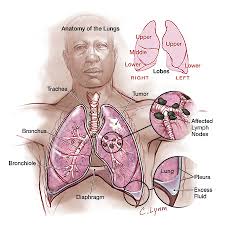
Smoking is the No. 1 cause of lung cancer, which causes about 160,000 deaths each year. Yet not all people with lung cancer are — or were — smokers. In fact, 10 to 15 percent of lung cancer deaths are from other causes.
Why Non-Smokers Get Lung Cancer
That's the big unanswered question.
"We're not sure why," says Joan Schiller, MD, chief of the division of hematology-oncology and deputy director of the Simmons Comprehensive Cancer Center at the University of Texas-Southwestern Medical Center in Dallas, president and founder of the National Lung Cancer Partnership, and national spokesperson for the American Lung Association. "Radon probably causes a small amount of it. Passive smoke probably causes a small amount of it. The rest of it — we're just not sure yet," she says.
Factors other than smoking thought to increase the risk of developing lung cancer include exposure to:- radon
- secondhand smoke
- asbestos
- radiation therapy
- combustion products
- other carcinogens
Lung Cancer Causes: Radon and Secondhand Smoke
According to the U.S. Environmental Protection Agency, exposure to radon is the leading cause of lung cancer in non-smokers. Radon gas is a product of decay, and found in almost all rock, soil, and water. It can seep into your home from the soil, usually though cracks and holes in your foundation. When you breathe in radon gas, radioactive particles may remain in your lungs, causing damage that can later lead to lung cancer. There are simple tests to check for radon in the air and water in your home and, if levels are high, "abatement" systems can be installed to filter the radon and lower those levels.
Secondhand smoke is thought to be the third-leading cause of lung cancer. You're exposed to it if there's a smoker in your home and when you're around people who are smoking, whether the smoke is coming from their lit cigarette, pipe, or cigar. Cities and towns across the country are banning smoking in restaurants, office buildings, and even on public sidewalks, but it's not yet banned everywhere. Some establishments, like bars, argue that it will hurt their business because drinkers often are smokers, too.
Certain people seemed to be predisposed to developing lung cancer, and may be particularly vulnerable to radon, secondhand smoke, and other lung cancer risk factors. Non-smoking women seem to be more vulnerable than non-smoking men. "About two-thirds of the patients with lung cancer who have never smoked are women, usually young women," says Dr. Schiller.
Lung Cancer Causes: Researching Other Reasons
Another possible cause of lung cancer in non-smokers is cooking fumes. Researchers looking at why non-smoking Taiwanese women develop lung cancer suggest an association between the cancer and the fumes created by their cooking food in oil heated to extremely high temperatures.
Ethnicity also could be a risk factor. One study shows that non-smoking African-Americans and Asians who live in Japan and Korea — but not the United States — died more frequently from lung cancer than those of European descent.
One ongoing study is comparing the blood and tissue from smokers and non-smokers with lung cancer to look for other risk factors that may lead to lung cancer. Another is looking at the DNA of non-smokers and smokers to determine how genetics may contribute to the development of lung cancer and other lung diseases.
As these studies uncover more information, everyone will be able to learn new ways to protect against lung cancer.



0 nhận xét:
Speak up your mind
Tell us what you're thinking... !